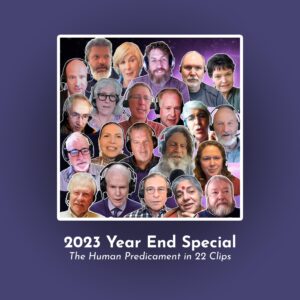
Summary
Following up last week’s Frankly outlining systemic themes for 2024, this year-end special is a reflection on 2023 with a series of clips, which together highlight the increasingly challenging world of which we are a part. From global heating and financial turmoil to rising geopolitical tensions and disruptive technological breakthroughs, The Great Simplification has been host to a wide range of critical conversations with scientists, leaders, and thinkers to dig deep into the science and insights into the increasingly chaotic world around us. Though each podcast and guest is unique, viewing these clips together reveals why we must take a systems view in our response to the human predicament.
In French, we have a motto that says that a simple drawing is often better than a long explanation. Jean-Marc Jancovici Carbone 4 President
That’s very understandable because with left atmosphere thinking, one of the problems is that you see everything as a series of problems that must have solutions. Iain McGilchrist Neuroscientist and Philosopher
We can’t have hundreds and hundreds of real relationships that are healthy because that requires time and effort and full attention and awareness of being in real relationship and conversation with the other human. Nate Hagens Director of ISEOF
This is the crux of the whole problem. Individual parts of nature are more valuable than the biocomplexity of nature. Thomas Crowther Founder Restor
Show Notes & Links to Learn More
00:56 – Jeremy Grantham – https://youtu.be/cTvN9iFJ0fY
03:08 – Jodi Archambault – https://youtu.be/J4Dhwta5R2Q
03:53 – Nick Haddad – https://youtu.be/_qzS5Nig4_w
04:59 – Lisi Krall – https://youtu.be/eQNI4bUv_Fs
05:42 – Josh Farley – https://youtu.be/EC11UQD9q3w
06:16 – Robert Sapolsky – https://youtu.be/xhobcj2K9v4
07:21 – Sian Sutherland – https://youtu.be/jTs6KejhSg4
08:07 – Daniel Schmachtenberger – https://youtu.be/_P8PLHvZygo
09:27 – Daniel Zetah – https://youtu.be/PtW_Fh9fViw
11:02 – Pella Thiel – https://youtu.be/NVeCw-Ljenk
12:14 – Chuck Watson – https://youtu.be/8T9vGNNdKKs
13:07 – Arthur Berman – https://youtu.be/qqTh2nBEcCs
13:56 – Vandana Shiva – https://youtu.be/lb2tJXopTJA
14:16 – John Kitzhaber – https://youtu.be/Z4cjl77rj78
15:00 – Peter Ward – https://youtu.be/tSgPQyq_jyE
16:49 – Robert Lustig – https://youtu.be/onVqjZOYlQs
17:35 – Luke Gromen – https://youtu.be/bIq0o40Jo80
18:27 – William Rees – https://youtu.be/LQTuDttP2Yg
18:58 – Kate Raworth – https://youtu.be/7h6X7WBANKY
20:07 – David Sloan Wilson – https://youtu.be/KbKymchp-54
21:17 – Iain McGilchrist – https://youtu.be/dogVQDydRGQ
22:26 – Nate Hagens – https://youtu.be/9Mgf7GyGPt4







